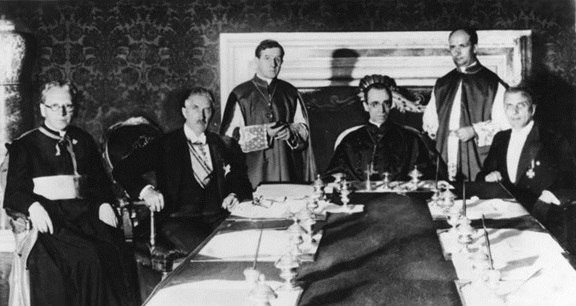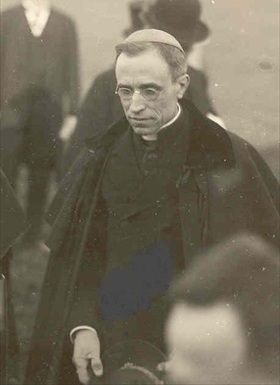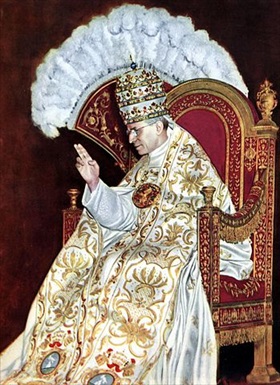NEW VATICAN HEAD IS PIUS XII
Rome, Italy · March 2, 1939
On this date in 1939 in Vatican City, Roman Catholic Cardinal Eugenio Pacelli was elected pope on his sixty-third birthday. His coronation took place ten days later. Pacelli took the name Pius XII. Pius’ actions during the Holocaust are controversial. Critics have accused him of everything from anti-Semitism to colluding with the Nazis. His defenders argue that his mostly silent diplomacy saved hundreds of thousands of innocent victims and Jews from Nazi terror.
Before being elected to the Papacy six months before the outbreak of World War II in Europe, Cardinal Pacelli had lived twelve years in Bavaria, the birthplace of Adolf Hitler’s Nazi Party, serving as Apostolic Nuncio for all Germany. He was well aware of the Nazis’ anti-Semitic practices and their extraordinary penchant for brutalizing their enemies. Reacting to widespread criticism of the Vatican’s concordat with Hitler’s government in July 1933—an agreement that he, as then-Vatican State Secretary, had been instrumental in drafting—the future pope privately told the British ambassador in Rome that the Catholic Church deplored the actions of the German government at home, their persecution of Jews, their proceeding against political opponents, and the reign of terror to which they subjected Germany and Austria. Between 1933 and 1939 Pacelli issued fifty-five protests of violations of the Reichskonkordat.
In his first encyclical letter as pope, issued a month and a half after the German invasion of Poland, he called for the restoration of that country’s independence, denounced racism, and called for love, compassion, and charity to prevail over war. For much of the war, Pius XII maintained a public front of neutrality, indifference, or silence while German atrocities were committed outside Italy. Privately and occasionally publicly he interceded to help Jews; for example, in July 1944 he pushed the Hungarian regent, Adm. Miklós Horthy, to cease his government’s deportation of Jews to Nazi death camps. When the German SS (or Schutzstaffel, the elite military unit and special police force of the Nazi Party) began ferreting out Jews from inside Italy in 1943 in places where the Wehrmacht (regular German armed forces) held sway, such as in Benito Mussolini’s so-called Republic of Salò in Northern Italy, Pius XII directed the Catholic Church to make substantial efforts to save Italian Jews. In the end, four-fifths of the Jewish population of Italy escaped slaughter—a remarkable record of moral courage.
[amazon_carousel widget_type=”ASINList” width=”600″ height=”200″ title=”Recommended Reading” market_place=”US” shuffle_products=”False” show_border=”False” asin=”080914476X,0813220165,0809105039,014311400X,1890318663,0895260344,0306816172,081321081X,1592765653,1890626600″ /]
Eugenio Marìa Giuseppe Giovanni Pacelli (Pius XII), 1876–1958
 |
Above: Vatican Secretary of State Eugenio Pacelli (seated, center) at the signing of the Reichskonkordat (treaty with German Reich) on July 20, 1933, in Rome. Seated to Pacelli’s right is Hitler’s vice-chancellor, Franz von Papen. Between 1933 and 1939 Pacelli issued dozens of protest violations of the Reichskonkordat, which he had hoped would protect the rights of Catholics under the new German government of Adolf Hitler. Pacelli’s actions as secretary of state and later as Pius XII have generated controversy, particularly on the subject of the Holocaust. An entire library of books has been built either defending his papacy or taking him to task. His detractors have accused him of everything from anti-Semitism to colluding with the Nazis (“Hitler’s pope”). Others claim the Catholic Church did more than any other religious body to save Jewish lives, occasionally through the pope’s personal intervention; e.g., when Pius XII instructed papal diplomats to aid persecuted Jews in occupied nations, contributed money to aid desperate Jews, opened Catholic facilities in the Vatican and in other parts of Rome and Italy to shelter thousands of Jews from the Nazis, and gave direct face-to-face orders to protect Jews from the Nazis.
 |  |
Left: Pacelli, Apostolic Nuncio (ambassador) to Bavaria (1917–1925), is seen paying a visit to a group of bishops in 1922. Pacelli was simultaneously Apostolic Nuncio to Germany (1920–1930).
![]()
Right: Pope Pius XII on his day of coronation, March 12, 1939. Pacelli (1876–1958) took the same papal name as his predecessor, a title used exclusively by Italian popes. When Pacelli was elected pope, the Nazi regime registered strong protests and called Pius XII the “Jewish Pope” because of his earlier condemnation of German race laws.
Coronation of Pope Pius XII (in Italian), March 12, 1939
![]()

 History buffs, there is good news! The Daily Chronicles of World War II is now available as an ebook for $4.99 on Amazon.com. Containing a year’s worth of dated entries from this website, the ebook brings the story of this tumultuous era to life in a compelling, authoritative, and succinct manner. Featuring inventive navigation aids, the ebook enables readers to instantly move forward or backward by month and date to different dated entries. Simple and elegant! Click
History buffs, there is good news! The Daily Chronicles of World War II is now available as an ebook for $4.99 on Amazon.com. Containing a year’s worth of dated entries from this website, the ebook brings the story of this tumultuous era to life in a compelling, authoritative, and succinct manner. Featuring inventive navigation aids, the ebook enables readers to instantly move forward or backward by month and date to different dated entries. Simple and elegant! Click 











